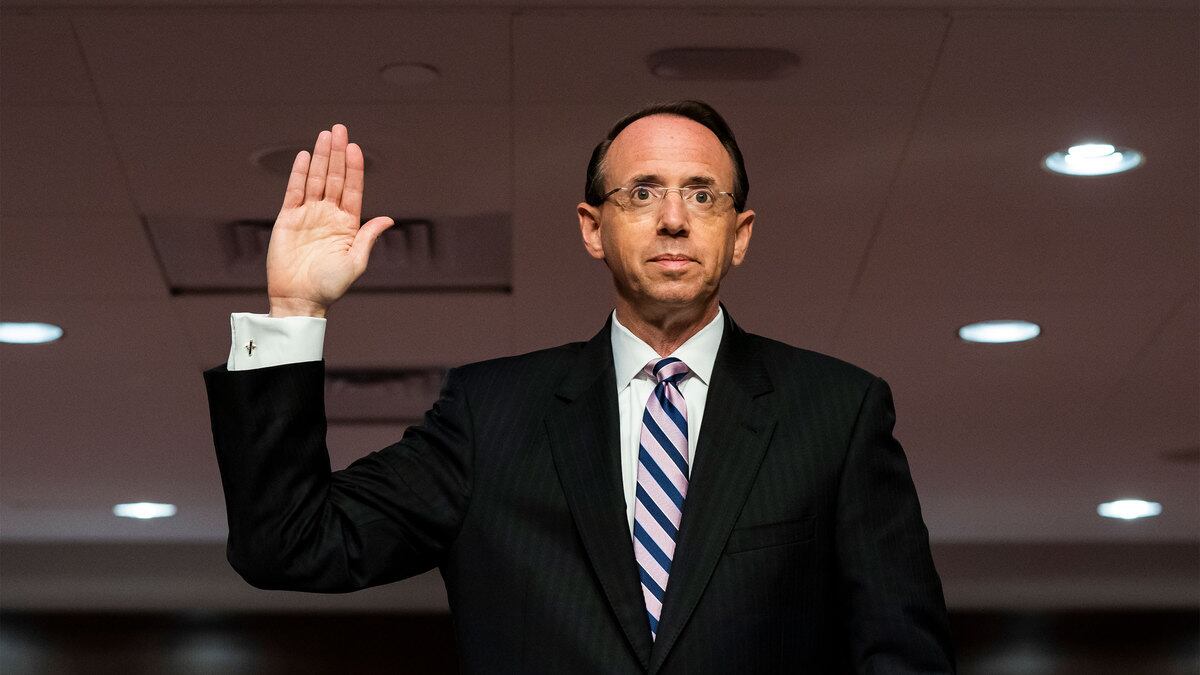The Senate Judiciary Committee has now headed down a partisan rabbit hole. On Thursday, the committee will likely vote to approve issuing 53 subpoenas against various political enemies of President Trump, including top campaign aides of Trump’s 2020 opponent, Joe Biden. Republicans assure us that they are not just running a political errand to dirty up Trump’s Democratic rival and advance Trump’s conspiracy theories.
We’ll see.
It is fair to question whether this will be a real investigation, consistent with the Judiciary Committee tradition of bipartisanship and sound oversight, or a partisan, scattershot fusillade to serve the Trump 2020 campaign. Opening indications are not good.
I recently read an article from The New York Post on the June 3 Judiciary Committee hearing that stopped me—a former federal prosecutor—in my tracks. The passage covered Rod Rosenstein’s testimony before us last week on his decision to sign off on FISA warrants. Here’s the part that caught my eye:
The key moment came in questioning from Senate Judiciary Committee Chairman Lindsey Graham (R-SC), who asked, “If you knew then what you know now, would you have signed the warrant application?,” referring to a Foreign Intelligence Surveillance Act warrant renewal concerning Trump campaign aide Carter Page.
“No,” testified Rosenstein, “I would not.”
And just like that, it became clear that the national torture of three years of the Russian collusion investigation simply should not have occurred.
State Department Inspector General Michael Horowitz’s report on the Russia investigation issued last December confirmed that there were false statements and material omissions in the FBI warrant applications. As a prosecutor, I would send back a warrant application I thought contained any false statements or material omissions. No supervisor at the Justice Department should sign off on a warrant application he knew contained false statements or material omissions. So this was an easy question for Rosenstein to answer.
But it does not support the conclusion that “the Russian collusion investigation simply should not have occurred.” If the warrant application I sent back came back to me corrected, without false statements or material omissions, I might well sign it. The fact that a prosecutor would not sign a warrant application he knew to be flawed does not mean the investigation stops; it merely means that the warrant application has to be corrected.
Should the investigation have continued? The investigation here was into Russian election interference, and there was in fact indisputable evidence of Russian election interference; indeed the investigation showed Trump campaign officials knew of and approved of it. The investigation here was into Trump campaign contacts with agents of Russian influence, and there were in fact such contacts; indeed, the investigation showed 120 such contacts.
Precision matters. The real question is whether Rosenstein would have refused to sign a corrected application, one without the errors or omissions identified by the Inspector General. Rosenstein conspicuously did not say that. Under the factual circumstances it is unreasonable to believe he would have ended the investigation rather than corrected the warrant application.
When precision matters, one ought not skim over important distinctions. It’s this kind of misleading narrative creation that gives me pause about what the Judiciary Committee investigation is pursuing, and whether creating these misleading narratives is in fact its purpose.
Another example: In a story on the Judiciary Committee investigation, Newsweek reported on “a declassified document identifying Obama administration officials who sought to ‘unmask’ Michael Flynn, later Trump’s short-lived national security advisor.”
This has been a Republican theme: that Obama officials went after Flynn to expose him.
Again, precision matters. By definition, the request to “unmask” a U.S. person who is referenced in an intelligence intercept is a request to identify an unknown person; the identity of the person is not disclosed in the intelligence report. That’s why you have to ask. The implication that Obama officials were targeting Michael Flynn with an unmasking request elides that fact. It is only the “unmasking” that would reveal it was Michael Flynn. The implication that Flynn was the target of an “unmasking” creates a narrative of persecution, but it’s a false narrative if you understand how unmasking actually works.
Following the persecution narrative, committee Republicans are working hard to suggest that Flynn was being “surveilled” by the FBI. Again, precision matters. The Russian ambassador was the target of the surveillance. Flynn called in to the Russian ambassador and was therefore picked up on the surveillance of the Russian ambassador. I’ve done wiretaps, and that’s a big difference; prosecutors and agents working wiretap cases understand clearly the difference between a surveilled target and someone who calls in to the surveilled target. Lawyers on the Judiciary Committee should understand that too.
A narrative is already emerging: an investigation that should have stopped dead based on warrant application errors; an investigation that targeted Michael Flynn via “unmasking,” and that put him under “surveillance.” But precision matters in a search for truth. This narrative serves the President, but not the truth. If these misleadingly imprecise slants are what the Judiciary Committee “investigation” is out to create, we are off to a very bad start.






